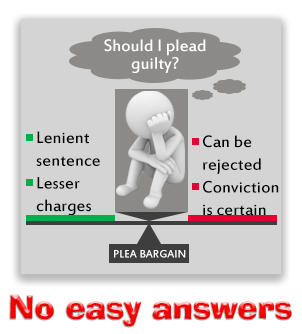We post news and comment on federal criminal justice issues, focused primarily on trial and post-conviction matters, legislative initiatives, and sentencing issues.
GOTTA BE QUICKER THAN THAT
 Here’s a conundrum. A whopping 97% plus of federal criminal defendants resolve their cases through plea bargaining. The strong majority of those people are guilty, if not of the charged offense, then of something related to but less than what was charged. A few are innocent, but can read the handwriting on the wall.
Here’s a conundrum. A whopping 97% plus of federal criminal defendants resolve their cases through plea bargaining. The strong majority of those people are guilty, if not of the charged offense, then of something related to but less than what was charged. A few are innocent, but can read the handwriting on the wall.
And what is that handwriting? The federal conviction rate, including both guilty pleas and trials, was 99.6% in 2016. By comparison, China’s is 99.92%, something we find worthy of criticism as “rule by law” rather than “rule of law.” In James Michener’s historical novel, Poland, he recounts that the Gestapo ran a kangaroo court in the Warsaw Jewish ghetto during World War II. For every 10,000 defendants who appeared in front of the Gestapo officers, 9,700 were convicted of some crime or another and sent to the camps. Lucky for those Polish Jews that they were not appearing before a federal district court: had they been, 9,960 of them would have been convicted.
 All of that is interesting, but is grist for another day. Instead, we want to focus on the many plea agreements that mention a defendant’s cooperation with the government. Cooperation is critical for many defendants, because only a motion for a downward sentence departure under USSG Sec. 5K1.1 because of substantial assistance (or, after the sentence, a motion pursuant to F.R.Crim.P. 35(b)) can let a judge sentence a defendant without regard for any mandatory minimum sentence statutes.
All of that is interesting, but is grist for another day. Instead, we want to focus on the many plea agreements that mention a defendant’s cooperation with the government. Cooperation is critical for many defendants, because only a motion for a downward sentence departure under USSG Sec. 5K1.1 because of substantial assistance (or, after the sentence, a motion pursuant to F.R.Crim.P. 35(b)) can let a judge sentence a defendant without regard for any mandatory minimum sentence statutes.
A defendant wants the government’s promise to be set in stone to the extent possible. No one wants a plea agreement with some mealy-mouthed commitment to “see what we can do later.” At the same time, the government cannot very well promise to move for a 50% sentence cut if the guy’s testimony successfully hangs his co-conspirator out to dry. A defense attorney would have a field day with such a promise, arguing to the jury that the cooperator’s testimony is bought and paid for (which is what it usually is). The government keeps things suitably vague, so a defendant can testify “no one has promised me anything, “despite the fact that his attorney has explained that if he plays ball with the prosecution, he’ll probably get a third or better off his sentence.
Unsurprisingly, the vagueness of the government’s plea agreement promise – which is always something like
if in the sole and unreviewable judgment of the USAO the defendant’s cooperation is of such quality and significance to the investigation or prosecution of other criminal matters as to warrant the Court’s downward departure from the advisory sentencing range calculated under the Sentencing Guidelines and/or any applicable minimum mandatory sentence, the USAO may make a motion prior to sentencing pursuant to Section 5Kl.1 of the Sentencing Guidelines and/or Title 18, United States Code, Section 3553(e), or subsequent to sentencing pursuant to Rule 35 of the Federal Rules of Criminal Procedure, informing the Court that the defendant has provided substantial assistance…”
 Hardly a solid promise. In fact, it reminds us of that insurance commercial where the policyholder is trying to snag a dollar refund, only to be told “Oops, almost had it. You gotta be quicker than that.”
Hardly a solid promise. In fact, it reminds us of that insurance commercial where the policyholder is trying to snag a dollar refund, only to be told “Oops, almost had it. You gotta be quicker than that.”
Still, the government usually comes through, because if it did not, word would get around and the pool of willing snitches would dry up fast. But there are times the government refuses or fails to come through. In those cases, what does a defendant do?
That is exactly the question John Doe (not his real name) asked himself. Facing a couple of serious drug distribution offenses, John made a plea deal which included a “substantial assistance” commitment like the one we quoted above. After John’s guilty plea, the district court didn’t sentence him right away, but instead held him in protective custody while he and a family member (Jane Doe, perhaps) helped the cops bring down a local drug operation. That cooperation placed both of their lives at risk.
The Assistant U.S. Attorney was happy with John’s assistance. However, the government, being the bureaucracy it is, ran substantial assistance requests through a committee. The AUSA twice asked the downward departure committee to approve the filing of a substantial-assistance motion on John’s behalf. Without explanation, and despite the opinion of both the AUSA and the local police, the committee denied the request.
 John filed a motion with the court to enforce the plea agreement. Citing general contract-law principles, he argued the government had acted arbitrarily and in bad faith by refusing to file a substantial-assistance motion. The district court denied John’s motion, reasoning that the plea agreement’s plain language left the decision to file a substantial-assistance motion to the government’s sole discretion. Based on a Guidelines range of 121 to 151 months in prison and a mandatory minimum of 120 months, the district court sentenced John to 121 months.
John filed a motion with the court to enforce the plea agreement. Citing general contract-law principles, he argued the government had acted arbitrarily and in bad faith by refusing to file a substantial-assistance motion. The district court denied John’s motion, reasoning that the plea agreement’s plain language left the decision to file a substantial-assistance motion to the government’s sole discretion. Based on a Guidelines range of 121 to 151 months in prison and a mandatory minimum of 120 months, the district court sentenced John to 121 months.
Last Friday, the 10th Circuit reversed the sentence. The Court held that under the Supreme Court’s decision in Wade v. United States, the district court was empowered to determine whether the denial of a Sec. 5K1.1 motion was “based on an unconstitutional motive” or “not rationally related to any legitimate [g]overnment end.” But, the Circuit said, Wade did not say that those were the only reasons for reviewing a government refusal. Rather, plea agreements are contracts, and contractual disputes are subject to certain legal principles.
One such principle is that “every contract imposes upon each party a duty of good faith and fair dealing in its performance.” And “courts are quite practiced at determining whether an allegation of bad faith has been established.” The 10th said that applying this contract principle, “the sole question before a district court undertaking such review is whether the government’s refusal to file a substantial-assistance motion is based on an honest evaluation of the assistance provided and not on considerations extraneous to that assistance… [I]f the government wishes to avoid even this minimal level of scrutiny, it can easily do so: it can decline to include discretionary substantial-assistance clauses in its plea agreements.”
 Of course, the government is not about to exclude the language, because that language is a big selling point to attract defendants to plea deals. Those defendants who “bargain away important rights in reliance on those clauses are entitled to a “reasonable expectation of receiving something in return for the surrender of their rights — i.e., a discretionary evaluation of their cooperation in good faith.” Accordingly, the Circuit said, “even when a plea agreement gives the government complete discretion to decide whether to file a substantial-assistance motion, a court may nevertheless review whether the prosecutor has made its determination not to file such a motion in good faith.”
Of course, the government is not about to exclude the language, because that language is a big selling point to attract defendants to plea deals. Those defendants who “bargain away important rights in reliance on those clauses are entitled to a “reasonable expectation of receiving something in return for the surrender of their rights — i.e., a discretionary evaluation of their cooperation in good faith.” Accordingly, the Circuit said, “even when a plea agreement gives the government complete discretion to decide whether to file a substantial-assistance motion, a court may nevertheless review whether the prosecutor has made its determination not to file such a motion in good faith.”
For a defendant seeking to trigger a good-faith review of a prosecutor’s discretionary refusal to file a substantial-assistance motion, he must “first allege that the government acted in bad faith. The government may then rebut that allegation by providing its reasons for refusing to file the motion. Assuming those reasons are at least facially plausible, we hold that a defendant is only entitled to good-faith review if he or she produces evidence giving reason to question the justification the government advanced.”
The district court’s refusal to consider whether the government acted in good faith required that the case be remanded.
United States v. Doe, Case No. 17-604 (10th Cir., Aug. 4, 2017)
– Thomas L. Root

